Following the April 1st strike on a building adjacent to the Iranian embassy in Damascus the BBC News website published a number of reports relating to the incident itself and what the BBC sees as potential implications.
The first of those reports appeared not long after news of the incident broke under the headline “Iran accuses Israel of killing generals in Syria strike” and is credited to Jeremy Bowen and David Gritten.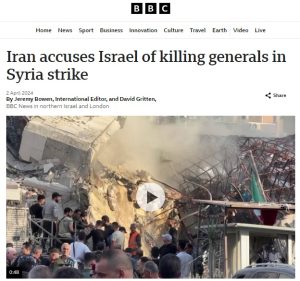
On the topic of the location of the strike, readers are told that: [emphasis added]
“Iran’s Revolutionary Guards say seven officers have been killed in an Israeli strike on the Iranian consulate building in Syria’s capital, Damascus. […]
Iran and Syria’s governments condemned the attack, which destroyed a building next door to the Iranian embassy.”
The people killed in the strike are described as follows:
“Brig-Gen Mohammad Reza Zahedi, a senior commander of the elite Quds Force, and Brig-Gen Mohammad Hadi Haji-Rahimi, his deputy, were named among the dead. […]
Later, the Revolutionary Guards put out a statement saying that seven of its officers were killed, including Brig-Gen Mohammad Reza Zahedi and Brig-Gen Mohammad Hadi Haji-Rahimi, whom it described as commanders and “senior military advisers”.
With regard to the roles of those IRGC-QF commanders, readers are told that:
“Iranian media said Zahedi, 63, was a senior figure in the Quds Force – the Revolutionary Guards’ overseas operations arm – and served as commander in Lebanon and Syria between 2008 and 2016. Haji-Rahimi was meanwhile identified as Zahedi’s deputy.”
Despite having reported that the IRGC had said that “seven of its officers were killed”, Bowen and Gritten chose to amplify an Iranian claim concerning “diplomats”:
“The Iranian ambassador, Hossein Akbari, said Israeli F-35 fighter jets “brutally targeted my place of residence and the consular section of the embassy, along with Iran’s military attaches”. He told Iranian state TV that between five and seven people were killed, including some diplomats.”
Bowen and Gritten also elected to promote a statement made by a Syrian official who has previously been platformed by Jeremy Bowen.
“Syria’s Foreign Minister Faisal Mekdad said he strongly condemned what he called “this heinous terrorist attack”, adding that it had killed “a number of innocent people“.”
As is often the case in BBC reporting on alleged Israeli airstrikes in Syria, the report uncritically amplifies unverified claims made by the Syrian military concerning its air defences.
“Syria’s defence ministry said Israeli aircraft targeted the Iranian consulate building, which was on a highway in the western Mezzeh district of Damascus, from the direction of the occupied Golan Heights at about 17:00 local time (14:00 GMT) on Monday.
Syrian air defences shot down some of the missiles they launched, but others made it through and “destroyed the entire building, killing and injuring everyone inside”, the ministry added.”
Equally unsurprising is the appearance in this report of Iranian propaganda concerning the purpose of IRGC forces in Syria which is often found in BBC reporting:
“Israel has previously acknowledged carrying out strikes in Syria to combat what it calls Iran’s “military entrenchment”, as well as shipments of Iranian weapons to allied groups which it proscribes as terrorist organisations.
Iran has said Revolutionary Guards have been sent to Syria to “advise” President Bashar al-Assad’s forces in the country’s civil war, but it has denied they have been involved in combat or established bases.”
Also on April 1st, the BBC News website published a filmed report titled “Smoke rises from destroyed Iranian consulate” – in which Faisal Mekdad describes the strike as being against a “diplomatic body” – the synopsis to which reads: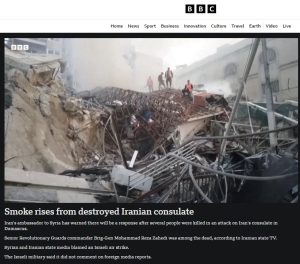
“Iran’s ambassador to Syria has warned there will be a response after several people were killed in an attack on Iran’s consulate in Damascus.
Senior Revolutionary Guards commander Brig-Gen Mohammad Reza Zahedi was among the dead, according to Iranian state TV.
Syrian and Iranian state media blamed an Israeli air strike.
The Israeli military said it did not comment on foreign media reports.”
On April 2nd the BBC News website published another report by David Gritten headlined “Iran vows to avenge deadly Syria strike blamed on Israel”.
That report promotes similar descriptions of the site of the strike: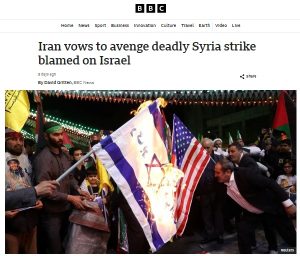
“Iran has vowed to respond to what it said was an Israeli strike on Monday that destroyed an Iranian consulate building in Syria’s capital, Damascus.”
“Iran’s mission to the United Nations in New York also said the strike constituted a “flagrant violation of the United Nations Charter, international law, and the foundational principle of the inviolability of diplomatic and consular premises“.”
“Iran’s ambassador, Hossein Akbari, said the strike was carried out by Israeli F-35 fighter jets and “targeted my place of residence and the consular section of the embassy, along with Iran’s military attaches”.”
In addition, readers are told that:
“The New York Times also cited four Israeli officials as confirming that Israel had carried out the strike but denying the building had diplomatic status.”
The people killed in the strike are described as follows:
“Iranian state TV reported that seven Revolutionary Guards, including two generals, and six Syrians were killed.”
“On Monday evening, Iran’s Revolutionary Guards put out a statement saying that seven of its officers were killed, including Brig-Gen Mohammad Reza Zahedi and Brig-Gen Mohammad Hadi Haji-Rahimi.”
“The Syrian Observatory for Human Rights, a UK-based monitoring group, reported that 11 members of Iran’s so-called “Axis of Resistance” were killed. They comprised eight Iranians, including seven commanders, two Syrians and one Lebanese national, it said.
Lebanese security sources also told Reuters that one member of Lebanon’s Iran-backed Hezbollah movement was killed.”
The job descriptions of the IRGC officers are portrayed as follows:
“On Tuesday, Iran’s president said the Revolutionary Guards commanders had been in Syria “as senior advisers in defending the holy shrine” – an apparent reference to a revered site on the outskirts of Damascus believed to house the tomb of Sayyida Zeinab, the daughter of the first Shia Muslim imam.”
“Iranian media said Zahedi, 63, was a senior figure in the Quds Force – the Revolutionary Guards’ overseas operations arm – and served as commander in Lebanon and Syria between 2008 and 2016. Haji-Rahimi was meanwhile identified as Zahedi’s deputy.”
“Iran has said Revolutionary Guards have been sent to Syria to “advise” President Bashar al-Assad’s forces in the country’s civil war, but it has denied they have been involved in combat or established bases.”
As we see, BBC audiences reading and viewing those initial BBC reports on this story would have received the impression that the strike took place at a consulate. With the exception of Gritten’s second-hand quote from the New York Times, no mention was made of the lack of clarity regarding that building’s status and function – a topic which is currently under review by the US administration. CAMERA has observed that:
“As Haaretz‘s Amos Harel explained:
“Since the Damascus bombing Monday, the Iranians have focused on the site that was attacked, a building attached to their embassy in Syria. Iran has described the structure as part of its consulate in the city. Israel asserts that it is not a diplomatic facility, that Iran has no consulate in Damascus and that all those who were killed were from the IRGC, Hezbollah and Syrian militias, known terrorists and no diplomats or ordinary civilians. Iran’s assertion of the building’s diplomatic status is aimed at laying the groundwork in the international arena for the Iranian case that the facility was under Iranian sovereignty, and tantamount to an attack on Iranian soil.”
BBC audiences were not provided with the names of five of the seven of the IRGC officers killed in the strike and were not informed that one of them – Hossein Amanollahi – was the chief of staff of the IRGC’s Quds Force in Syria and Lebanon.
The BBC’s minimalist portrayals of the roles of the two named IRGC commanders killed tells audiences what Zahedi did between 2008 and 2016 but not that he had been sanctioned by the United States since 2010, when he was described as follows:
“Mohammad Reza Zahedi, the commander of the IRGC-QF in Lebanon, plays a key role in Iran’s support to Hizballah. Zahedi held several senior positions in the IRGC-Qods Force including Commander of the Lebanon Corps and Deputy Commander of the Qods Force. He has also acted as a liaison to Hizballah and Syrian intelligence services and is reportedly charged with guaranteeing weapons shipments to Hizballah.
Ynet described Zahedi’s activities thus:
“Zahedi served under Quds Force commander Esmail Qaani but was more influential and had more impact on Iranian forces. Under his command, all plans for directing Iranian combat assets to Syria and Lebanon were approved, and the targeted building in the attack in Damascus served as a military command center for the local Iranian forces.
Zahedi was a senior IRGC officer serving as Iran’s envoy to command the Quds Force in Lebanon and Syria. He effectively led the IRCG’s regional Intelligence Division, and ground and air forces. He was also involved in planning terrorist operations within Israel.”
It was later reported that Zahedi was also a member of Hizballah’s Shura Council and Iranian sources claimed that he had been involved in the planning and execution of the October 7th attacks.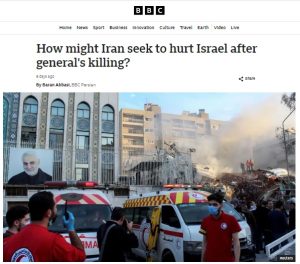
The only brief mention of that part of the story comes in a BBC report published on April 4th under the headline “How might Iran seek to hurt Israel after general’s killing?” in which BBC Persian’s Baran Abbasi tells readers that:
“Hamas’s military wing, the Qassam brigades, has said Brig Gen Zahedi had a “prominent role” in the 7 October Hamas attacks on southern Israel, which sparked the current war in Gaza that is threatening to spread. Iran has denied a role in the attack itself but backs Hamas with funding, weapons and training.”
That report also gives a more realistic portrayal of the function of the IRGC-QF than the previous content, stating that it is “is really for coordination and arms and technology transfers to Hezbollah in Lebanon and Syria”.
However, on April 8th the BBC News website published another report – “Israel ‘can handle’ any threat from Iran, says military chief” by Ian Aikman – which reverts to the previously seen framing.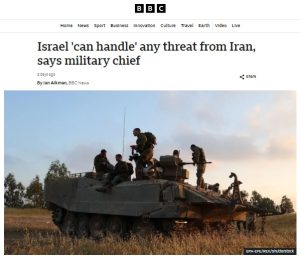
“Israel’s military has said it is prepared for any Iranian threat, as tension builds after Monday’s attack on an Iranian consulate in Damascus.”
“Syria’s defence ministry said Israeli aircraft targeted the Iranian consulate building at about 17:00 local time (14:00 GMT) on Monday.
Syrian air defences shot down some of the missiles, but others made it through and “destroyed the entire building, killing and injuring everyone inside”, the ministry added.
Iran’s Revolutionary Guards said that seven of its officers were killed in the strike, including Brig-Gen Mohammad Reza Zahedi and Brig-Gen Mohammad Hadi Haji-Rahimi.”
“Iran has said the guards were sent to Syria to “advise” President Bashar al-Assad’s forces in the country’s civil war, but it has denied they have been involved in combat or established bases.”
As we see, all the BBC’s coverage of this story promotes the Iranian messaging concerning the status of the site attacked. Only two of the IRGC-QF officers targeted are named and BBC audiences are not given the full range of relevant information about their activities – including the fact that Zahedi was the most senior officer on the northern front and that the Quds force oversees the actions of Hizballah and other Shia militias. Clearly the “range and depth of analysis and content not widely available from other United Kingdom news providers” which the BBC is obliged to provide its audiences was not evident in its coverage of this story.
Related Articles:
BBC’S BOWEN PROVIDES A STAGE FOR SYRIAN PROPAGANDA
BBC BACKGROUNDER ON ‘A WEEK OF MISSILE STRIKES’ ERASES ATTACKS ON ISRAEL
UNPARALLELED INTELLIGENCE: UPI CLAIMS TO KNOW MORE THAN U.S. ON DAMASCUS STRIKE (CAMERA)

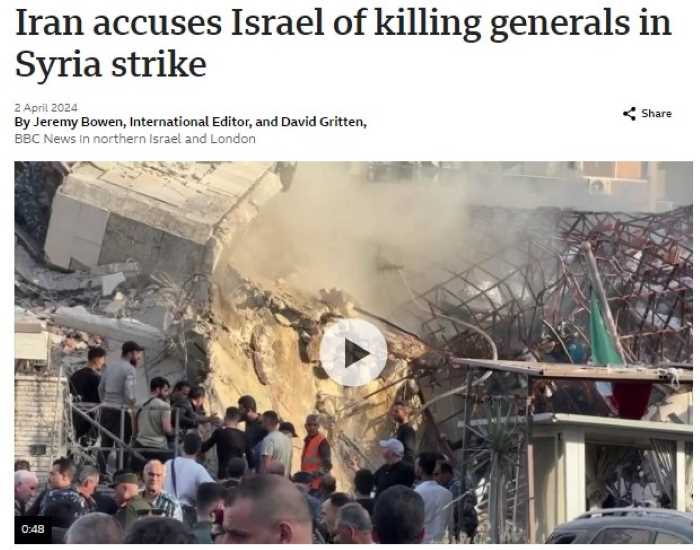
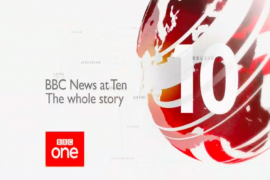

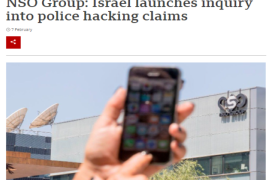
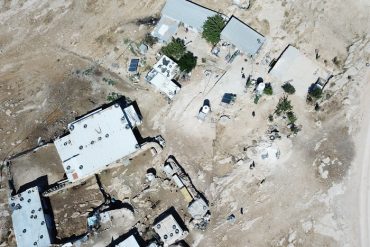
This reporting by the IPC (aka BBC) is clearly on the side of Iran – and demonstrates its support of Iran’s avowed intention to wipe Israel off the map. With such an ongoing threat, Israel is entitled to take whatever steps it deems necessary to survive.